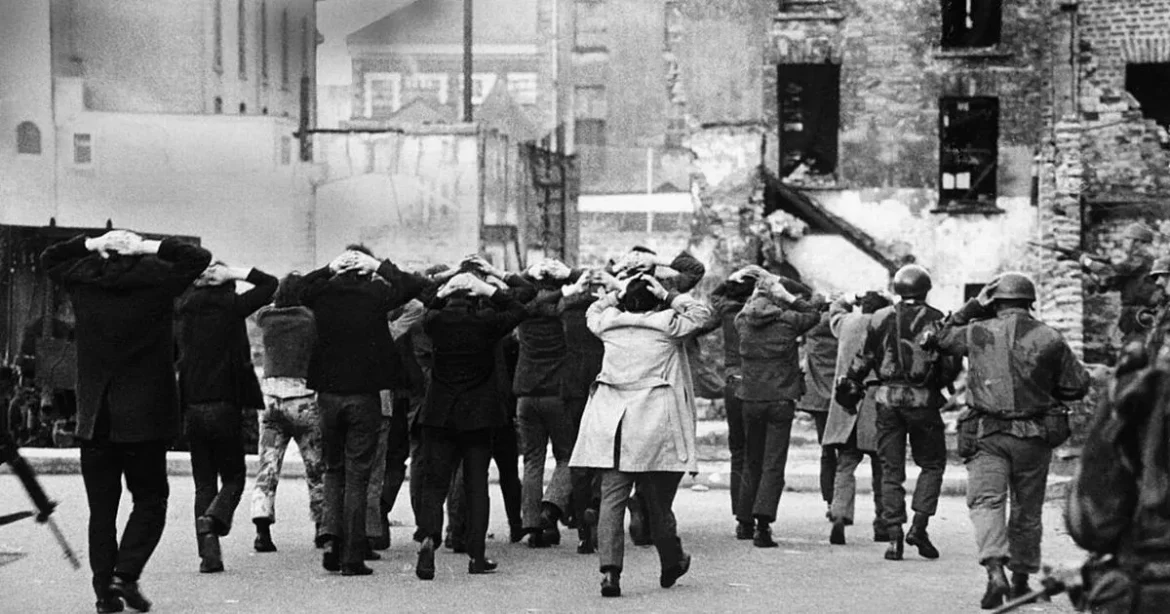The former Para is accused of the murders of James Wray and William McKinney and attempting to murder five others
A judge has risen to consider an application to dismiss the case against a former paratrooper accused of the murder of two men during the events of Bloody Sunday in 1972.
Judge Patrick Lynch heard arguments that the key evidence against the veteran, referred to as Soldier F for legal reasons, was unreliable and could potentially lead to an unsafe conviction.
However, the prosecution have said accounts by fellow former paratroopers Soldier G and Soldier H provide direct evidence from two separate sources that Soldier F fired at civilians.
Soldier F is charged with the murders of James Wray and William McKinney during disorder after a civil rights parade in Londonderry on January 30, 1972.
Some 13 people were shot dead by the Parachute Regiment on the day.
Soldier F is also accused of attempting to murder Michael Quinn, Patrick O’Donnell, Joseph Friel, Joe Mahon and an unknown person. He has pleaded not guilty to the seven counts.
Soldier F sits in the courtroom at Belfast Crown Court behind a curtain during each day of the non-jury trial, which began last month.
Key evidence in the case described as “decisive” by the prosecution includes statements by two other former paratroopers known as Soldier G and Soldier H.
Their accounts place Soldier F in Glenfada Park North, and allege that he had opened fire.
The two veterans have not been able to be cross-examined on their previous statements during this trial. Soldier G has died and Soldier H has indicated he will exercise his right against self-incrimination if summoned.
The prosecution concluded their case on Friday, when the court also heard that Soldier F had been interviewed voluntarily under caution across two days from March 8-9 2016 by officers from the PSNI.
He declined to respond to questions on the basis that he “no longer” has “any reliable recollection of those events” and made no comment to all questions put to him.
Defence barrister Mark Mulholland KC said the evidence does not “stack up” and has argued for the case to be dismissed.
On Monday he queried changes in the statements given by Soldier H to the Royal Military Police on the night of the shootings, to the Widgery Inquiry later that year, and the Saville Inquiry in the 2000s, and described him as an “unreliable witness”.
On Tuesday Mr Mulholland turned to the evidence of Soldier G, and put to the court that the statements of G and H fundamentally contradict each other in terms of who has fired, where and when.
“We go from three youths with nail bombs in H, to two youths with M1 carbines in G and, quite tellingly on their own accounts, G doesn’t seem to see H fire, and H, moving aside from the waste ground statement, then has G fire but can’t say what he was firing at,” he said.
“At every turn the contradictions are absolutely fundamental when one considers their bearing on reliability of the accounts that they provide.”
Mr Mulholland said they are “swimming in this stagnant pool of contaminated fabricated evidence”, adding: “When one steps back for a moment, how does one start to distinct fact from fiction in these accounts?”
“Looking now at the state of this evidence in light of the unequivocal civilian evidence, it just simply does not stack up,” he added.
Earlier in the trial, Judge Patrick Lynch ruled that the hearsay evidence could be admitted.
Almost three weeks later, on Tuesday, Mr Mulholland said in light of some evidence not having been called by the prosecution, the defence assesses it is essential for the court to revisit the admitted hearsay evidence.
“The critical issue that was flagged at the outset in our submission remains as part of that, which is, ‘did Soldier F fire his weapon at the material time in Glenfada Park North’, and that is the prosecution case,” he said.
“The import the statements of G and H are that F, acting together with G, opened fire in Glenfada Park North. That case is the case we have to meet, that’s the case on the evidence we respectfully submit now, that one sees the full evidential landscape is simply lacking when one considers the other evidence that can be called.”
He added: “According to the prosecution opening, G and H’s demonstrably false accounts was an attempt to justify and confuse. That may be the most logical explanation of all.”
Louis Mably KC, for the prosecution, said: “That hearsay evidence provides direct evidence that Soldier F opened fire at civilians.
“That evidence comes from two separate sources, Soldier G and Soldier H.
“The evidence was repeated by each witness on different occasions including on oath.
Judge Lynch said he would deliver his ruling on the defence application on Thursday.
For all the latest news, visit the Belfast Live homepage here and sign up to our daily newsletter here.
#Soldier #Judge #considers #application #halt #trial #Bloody #Sunday #murders

